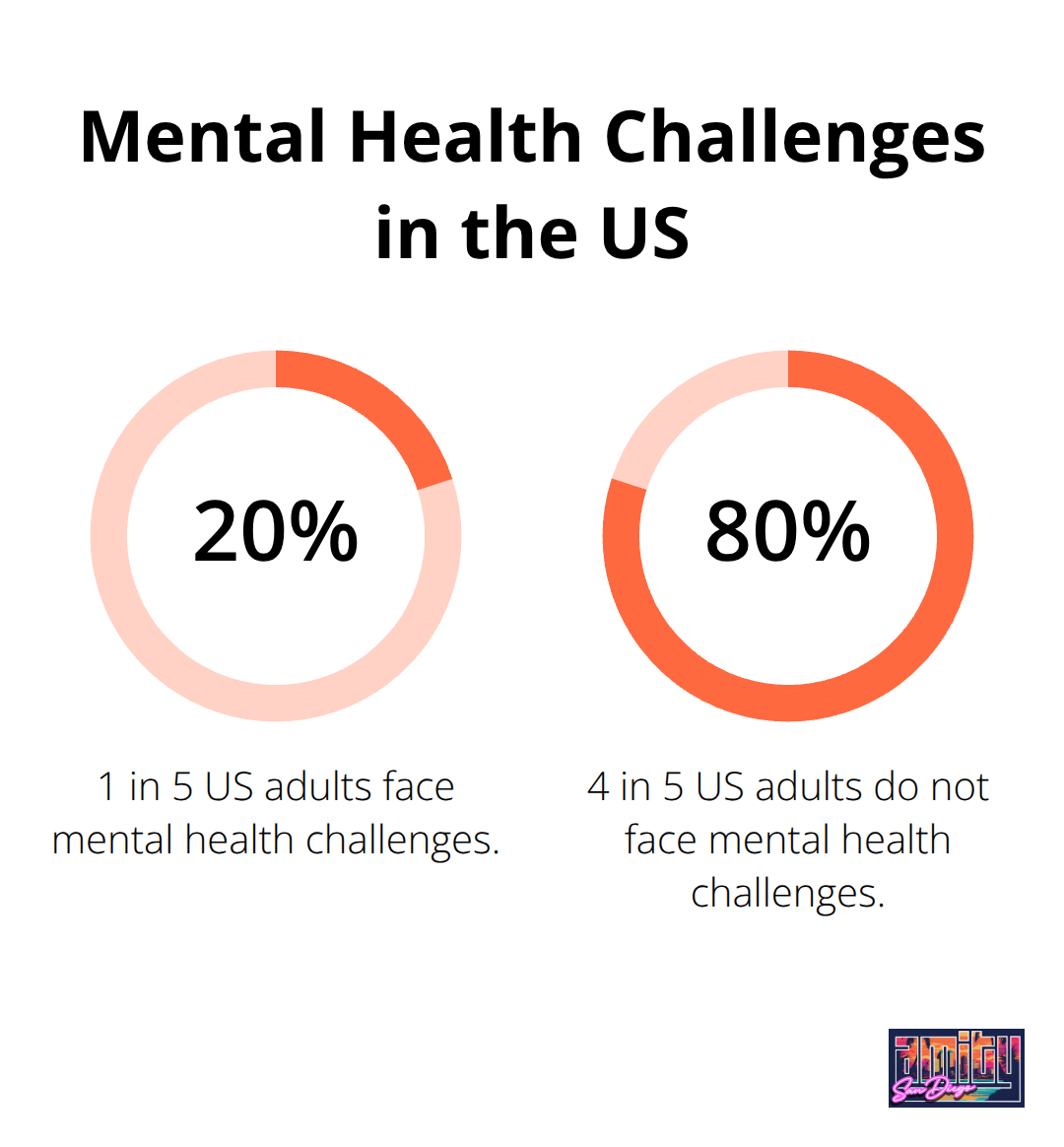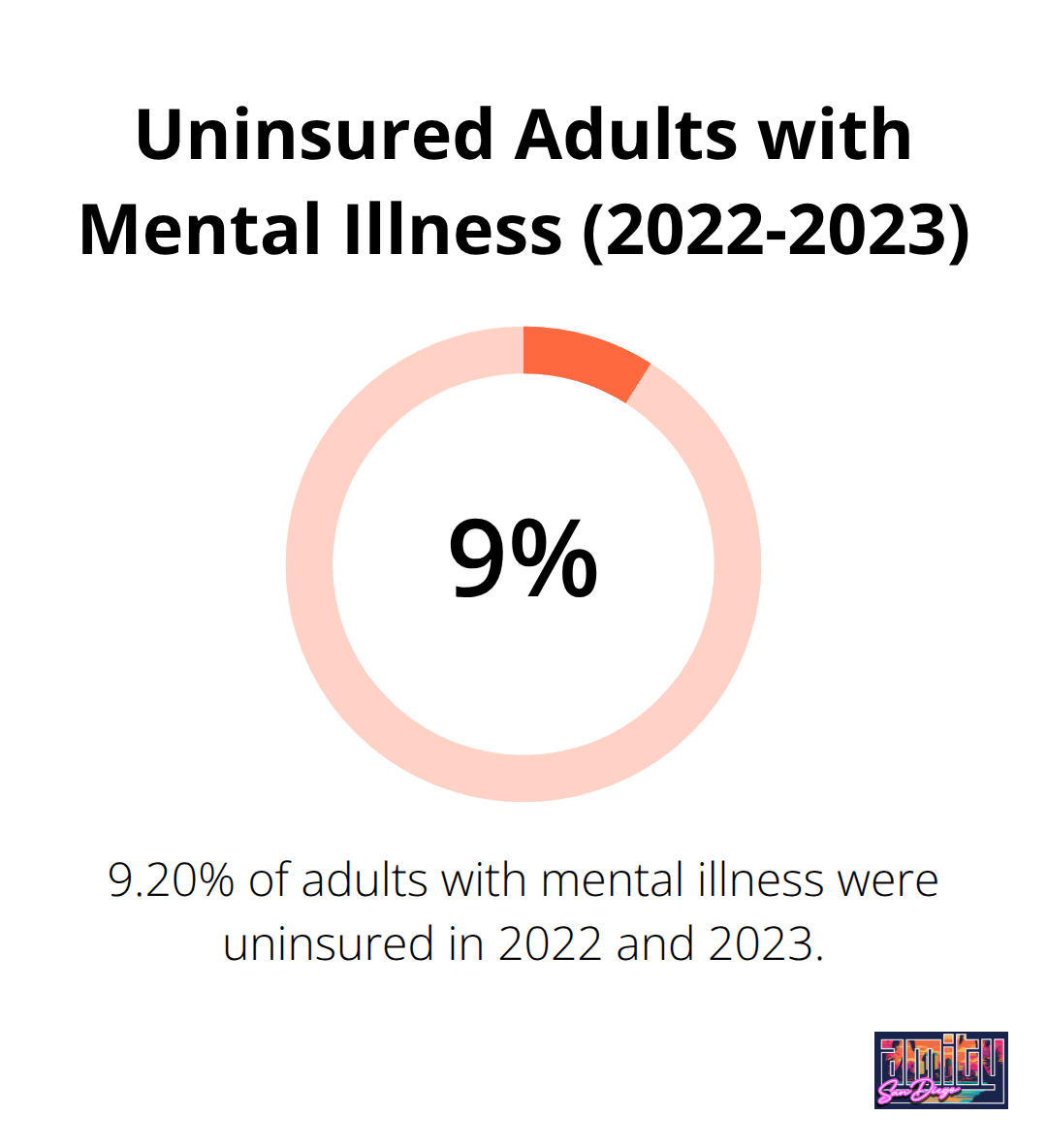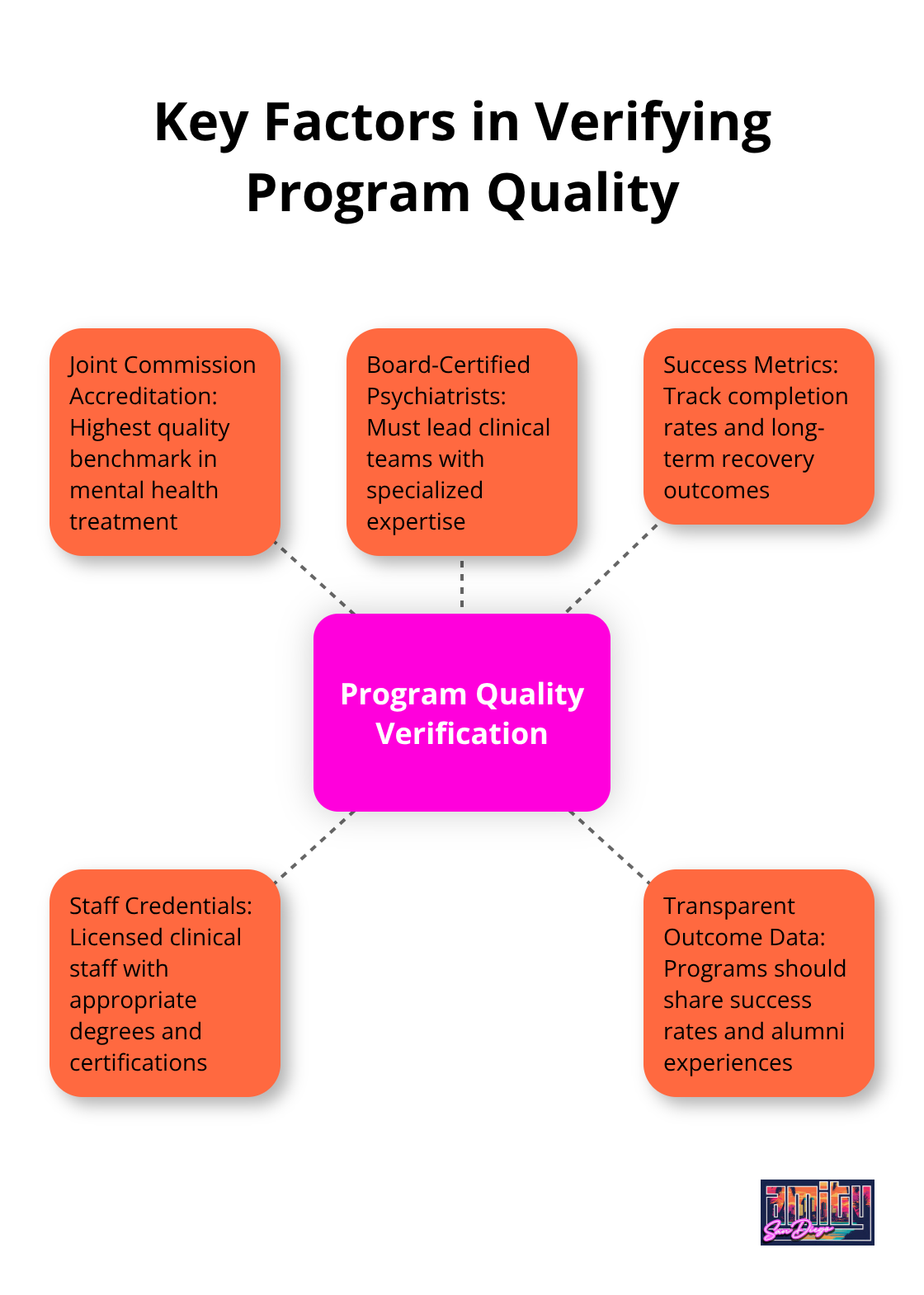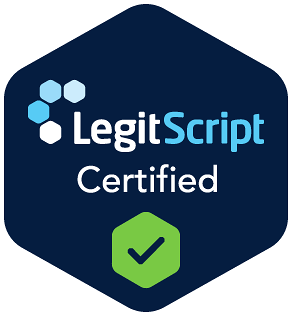Mental health challenges affect 1 in 5 adults in the United States, yet finding the right level of care can feel overwhelming. Residential treatment programs for mental health offer intensive support when outpatient therapy isn’t enough.

We at Amity San Diego understand that choosing between different program types requires careful consideration of your specific needs and circumstances.
What Are Your Residential Treatment Options?
Hospital-Based Psychiatric Care
Hospital psychiatric units serve patients who experience severe mental health crises that require 24/7 medical supervision. These programs typically last 3-14 days and focus on stabilization rather than long-term recovery. According to the National Substance Use and Mental Health Services Survey, facilities nationwide provide hospital inpatient care to address acute mental health needs.
Psychiatrists and nurses provide medication management, crisis intervention, and safety monitoring around the clock. The intensive medical model works best for acute episodes, suicidal ideation, or when mental health symptoms prevent basic self-care. However, the institutional environment and brief duration limit comprehensive therapy work that addresses underlying issues.
Long-Term Residential Treatment Centers
Residential treatment centers offer extended stays that range from 30 days to 12 months in home-like settings. The American Residential Treatment Association identifies four main types: clinical programs with daily professional therapy, group homes that emphasize family-like communities, farm-based programs that integrate work activities, and apartment-style communities that promote independence.
These facilities treat adults with severe mental illness who need intensive support beyond outpatient care. Patients participate in individual therapy, group sessions, vocational training, and life skills development. The longer duration allows deeper therapeutic work on trauma, relationship patterns, and coping strategies. Inpatient mental health treatment costs $500-$2,000 per day, making insurance verification essential before admission.
Intensive Day Programs Without Overnight Stays
Partial hospitalization programs provide 6-8 hours of daily treatment Monday through Friday while patients return home each evening. These programs bridge the gap between inpatient care and traditional outpatient therapy. Intensive outpatient programs require 3-4 hours of treatment three times weekly.
Both options include group therapy, individual counseling, medication management, and family sessions. Day programs work particularly well for professionals or parents who need intensive support while they maintain family responsibilities. The structured environment provides accountability and peer support without the disruption of residential placement.
These flexible treatment options address both substance use and mental health conditions simultaneously through comprehensive dual diagnosis care. Each program type offers distinct advantages, and your choice depends on factors like symptom severity, support system strength, and treatment goals. For those seeking specialized care, consider exploring addiction treatment San Diego options that provide comprehensive support.
What Should You Prioritize When Selecting a Program?
Evidence-Based Treatment Approaches Matter Most
Cognitive Behavioral Therapy stands as the gold standard for mental health treatment, with long-term studies that confirm its effectiveness for depression, anxiety, and trauma disorders. Your chosen facility must offer CBT alongside other proven therapies like Dialectical Behavior Therapy and EMDR. Skip programs that rely heavily on unproven alternative treatments or lack licensed clinical staff.
SAMHSA leads efforts to advance behavioral health across the U.S., offering resources for mental health, substance use, and community well-being. Ask potential facilities for their treatment protocols and staff credentials before you make any commitments. Quality programs will provide detailed information about their therapeutic approaches and clinical team qualifications.
Insurance Coverage Determines Your Real Options
Mental Health America reports that 9.20% of adults with any mental illness were uninsured in 2022 and 2023, totaling over 5 million people, while residential treatment costs $15,000-$60,000 for 30 days. Contact your insurance provider directly to verify residential mental health benefits before you tour facilities. Major insurers like UnitedHealthcare, Cigna, and Blue Cross Blue Shield cover different facility types and treatment lengths.

Many quality programs offer fees based on income (through sliding-scale arrangements), but private facilities often require significant out-of-pocket payments. Healthcare service prices have increased significantly in recent years, which makes early insurance verification essential for your financial planning. For those seeking comprehensive addiction treatment San Diego options, understanding insurance coverage becomes even more critical.
Location and Duration Impact Treatment Success
Choose facilities within a reasonable distance of your support system, as family involvement significantly improves outcomes. Farm-based and work-integrated programs in rural settings often provide better long-term results than urban hospital-based facilities. Program duration should match your symptom severity – acute episodes need 30-90 days while chronic conditions benefit from 6-12 month stays.
Avoid programs shorter than 30 days for serious mental health conditions, as insufficient treatment duration leads to higher relapse rates and repeated hospitalizations. The right program length allows you to develop coping skills and address underlying issues that contribute to your mental health challenges.
Once you identify programs that meet these basic criteria, you need to evaluate their quality standards and track record of success.
How Do You Verify Program Quality and Credentials?

Joint Commission Accreditation Sets the Gold Standard
The Joint Commission surveys many types of organizations under behavioral health care standards, including mental health services and addiction treatment facilities. Their behavioral health standards represent the highest quality benchmark in mental health treatment. Programs without Joint Commission accreditation often lack proper safety protocols, medication management systems, and clinical oversight. CARF accreditation also indicates quality, but Joint Commission certification carries more weight with insurance providers and demonstrates comprehensive compliance with federal regulations.
State requirements vary dramatically between jurisdictions, with California, New York, and Massachusetts that maintain the strictest oversight standards. Contact your state’s Department of Health Services to verify any facility’s current status before admission. Unlicensed facilities cannot bill insurance and often employ unqualified staff who lack proper crisis intervention and medication management skills.
Board-Certified Psychiatrists Must Lead Clinical Teams
Residential programs need board-certified psychiatrists who specialize in your specific condition, whether that’s treatment-resistant depression, bipolar disorder, or trauma-related disorders. The American Board of Psychiatry and Neurology maintains public databases where you can verify physician credentials and specialty certifications. Programs led by general practitioners or nurse practitioners lack the expertise to manage complex medication regimens and psychiatric emergencies.
Licensed clinical social workers, marriage and family therapists, and addiction counselors should hold master’s degrees from accredited programs. Staff turnover rates above 25% annually indicate poor conditions that directly impact treatment quality. Ask facilities for their average therapist tenure and staff-to-patient ratios (as high-quality programs maintain ratios of 1:8 or better for group therapy sessions).
Success Metrics Reveal Program Effectiveness
Legitimate treatment programs track 30-day, 90-day, and one-year sobriety rates among alumni, with quality facilities that maintain strong completion rates and sustained recovery outcomes. Programs that refuse to share outcome data or claim unrealistic success rates above 90% typically manipulate statistics or lack proper follow-up systems. The National Institute on Drug Abuse reports that effective treatment programs maintain contact with alumni for at least 12 months after completion.
Alumni testimonials provide valuable insights, but focus on specific details about treatment approaches rather than general praise. Quality programs connect prospective patients with recent graduates who can discuss their experiences candidly. Avoid facilities that only provide written testimonials or refuse alumni contact (as transparency in outcomes demonstrates confidence in their treatment model). For comprehensive addiction treatment San Diego options, research facilities that meet these quality standards.
Final Thoughts
Quality residential treatment programs for mental health demand Joint Commission certification, board-certified psychiatrists, and transparent outcome data. These standards separate effective facilities from substandard options that lack proper oversight. Insurance verification and location considerations directly impact your treatment success and financial stability.
The path to recovery starts with honest assessment of your needs and thorough research of available programs. Contact multiple facilities, verify their credentials, and speak with alumni when possible. Quality treatment centers provide detailed information about their approaches and welcome your questions.
We at Amity San Diego provide comprehensive outpatient programs with evidence-based therapies in a supportive environment. Our team addresses both addiction and co-occurring mental health conditions through our PHP and IOP programs (designed to meet individual recovery needs). If you’re ready to take the first step toward healing, Amity San Diego offers personalized treatment plans that support your journey to wellness.



